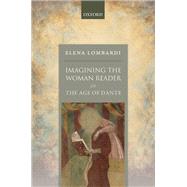Imagining the Woman Reader in the Age of Dante
, by Lombardi, Elena- ISBN: 9780198818960 | 0198818963
- Cover: Hardcover
- Copyright: 7/24/2018
Imagining the Woman Reader in the Age of Dante brings to light a new character in medieval literature: that of the woman reader and interlocutor. It does so by establishing a dialogue between literary studies, gender studies, the history of literacy, and the material culture of the book in medieval times.
From Guittone d'Arezzo's piercing critic, the 'villainous woman', to the mysterious Lady who bids Guido Cavalcanti to write his grand philosophical song, to Dante's female co-editors in the Vita Nova and his great characters of female readers, such as Francesca and Beatrice in the Comedy, all the way to Boccaccio's overtly female audience, this particular interlocutor appears to be central to the construct of textuality and the construction of literary authority. This volume explores the figure of the woman reader by contextualizing her within the history of female literacy, the material culture of the book, and the ways in which writers and poets of earlier traditions imagined her. It argues that these figures are not mere veneers between a male author and a 'real' male readership, but that, although fictional, they bring several advantages to their vernacular authors, such as orality, the mother tongue, the recollection of the delights of early education, literality, freedom in interpretation, absence of teleology, the beauties of ornamentation and amplification, a reduced preoccupation with the fixity of the text, the pleasure of making mistakes, dialogue with the other, the extension of desire, original simplicity, and new and more flexible forms of authority.
From Guittone d'Arezzo's piercing critic, the 'villainous woman', to the mysterious Lady who bids Guido Cavalcanti to write his grand philosophical song, to Dante's female co-editors in the Vita Nova and his great characters of female readers, such as Francesca and Beatrice in the Comedy, all the way to Boccaccio's overtly female audience, this particular interlocutor appears to be central to the construct of textuality and the construction of literary authority. This volume explores the figure of the woman reader by contextualizing her within the history of female literacy, the material culture of the book, and the ways in which writers and poets of earlier traditions imagined her. It argues that these figures are not mere veneers between a male author and a 'real' male readership, but that, although fictional, they bring several advantages to their vernacular authors, such as orality, the mother tongue, the recollection of the delights of early education, literality, freedom in interpretation, absence of teleology, the beauties of ornamentation and amplification, a reduced preoccupation with the fixity of the text, the pleasure of making mistakes, dialogue with the other, the extension of desire, original simplicity, and new and more flexible forms of authority.






